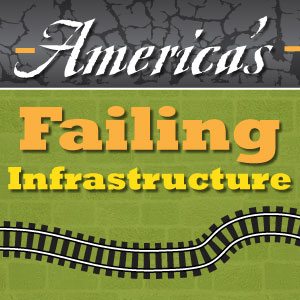America’s Failing Infrastructure
By Scarlett Jackson
America’s Failing Infrastructure
America’s greatest generation built the world’s greatest infrastructure network.
Building…
Roads
1950′s: Eisenhower Interstate Highway System[6]
Over 47,000 miles of interstates
Today:Close to 4 million miles of total roads
Enough to circle the Earth 160 times
Rails
1860′s: First intercontinental railroads constructed
Today:150,000 miles of mainline track
The busiest and largest rail system in the world
Bridges
1950′s: Louisiana’s Lake Ponchetrain Bridge (24 miles) is the longest bridge in America completed.[1]
Today: 607,380 bridges
Tunnels
1979: the Eisenhower tunnel spans 1.7 miles through mountains west of Denver. At 11,000+ feet it is the highest point of the Interstate Highway System.[2]
Canals
1825: Erie Canal connects the great lakes to the Atlantic through NYC.[3]
1914: Panama Canal finished, cutting off 8,000 miles from the the NY to LA sea route.
Ports
April 6th 1776: defying British rule, all American colony ports are opened to international trade.[4]
Today: 360 commercial ports in the U.S. ship $1.73 million in goods, or 11% of total GDP [5]
Airports
1909: College Park Airport in Maryland is the oldest continually operating airport in the world. Founded by Wilbur Wright. [8]
Today: Over 640 million passengers and 19.6 billion pounds of shipped goods in 2013.[7]
But over time it’s failed to adapt.
BY 2010, America wasn’t even in the top ten for infrastructure competitiveness:
1.) Hong Kong
2.) Germany
3.) United Arab Emirates
4.) France
5.) Singapore
6.) Switzerland
7.) Netherlands
8.) United Kingdom x
9.) Canada
10.) Sweden
…
15.) United States
Which costs a lot, personally, and nationally.
Personally: Even with higher household earnings, we spend more money on transportation than other developed nations.
[% of household earnings spent on transportation]
America: 17.6%
Canada: 14%
EU: 13%
Japan: 12.5%
That’s $8,810 yearly per family![$50,054 x .176]
With 4.8 billion hours wasted in traffic jams in 2008.[9]
TO the tune of 3.9 billion gallons of gas.
Nationally: Freight bottlenecks and congestion cost about $200 billion[9]
Or 1.6% of the U.S. GDP in losses each year.
Chicago is the nations largest railroad center.
Due to congestion, it currently takes a freight train longer to travel through Chicago’s city limits than it takes for a train to travel from Chicago to L.A.
We’re not doing enough to remedy the solution
[% gdp spent on investment in new infrastructure]
2.4% Australia[9]
1.66% Sweden
1.53% France
1.48% Poland
1.29% Spain
1.15% UK
1.03% Belgium
.8% Germany
.6% America
[% gdp spent on maintenance of infrastructure]
Maintenance Costs:
9% China
4% Canada
1.7% U.S.
Even though EVERY CENT of our GDP relies on infrastructure.
Rails–
15,000 miles of high speed rails worldwide[9]
Close to 0 of which are in the U.S.
=
less efficient highway and plane passenger travel
High Speed vs. Old-Fashioned
New York–Chicago
711miles/42 MPH/17 Hours
Beijing-Shanghai
819 miles/168 Mph/5 hours
America’s passenger trains are slower than they were 50 years ago.
Highways–
131,723 miles of roads built just from 1988 to today!
(Enough to circle the Earth 5 times)
…Without a plan to take care of existing roads…
210 million daily trips are taken across deficient bridges in our 102 largest cities.[10]
1/4 American Bridges are functionally obsolete, or structurally deficient.
Including 77% of Washington D.C.’s bridges falling into these categories.
Ports–
The U.S. has fallen to 22nd for quality of port infrastructure
And is losing traffic abroad.
Airports–
High inefficiency=waste
1.) Are still using the same ground-based, radar system developed in the 1950′s.[9]
2.)1/3 of all U.S. flights pass through NY, magnifying any delays at NY’s 3 main airports across the country.[9]
Without a plan it’s only going to get worse.
Projected increase in travel and freight:[9]
2020:Port volume will double
2030: Car passenger miles to increase 80%
2035: Train freight to increase by 88%
Our personal safety, financial stability, and lifestyle depends on the health of our infrastructure.
Citations:
- http://www.weather.com/travel/driving-scenic-drives/10-longest-bridges-us-photos-20130910?pageno=10
- http://en.wikipedia.org/wiki/Eisenhower_Tunnel
- http://www.britannica.com/EBchecked/topic/191438/Erie-Canal
- http://www.history.com/this-day-in-history/congress-opens-all-us-ports-to-international-trade
- http://www.aapa-ports.org/Industry/content.cfm?ItemNumber=1032
- http://en.wikipedia.org/wiki/Transportation_in_the_United_States#Road_transportation
- http://www.transtats.bts.gov/
- http://en.wikipedia.org/wiki/Airport
- http://www.bafuture.com/sites/default/files/Report_0.pdf
- http://www.infrastructurereportcard.org/a/#p/bridges/conditions-and-capacity



